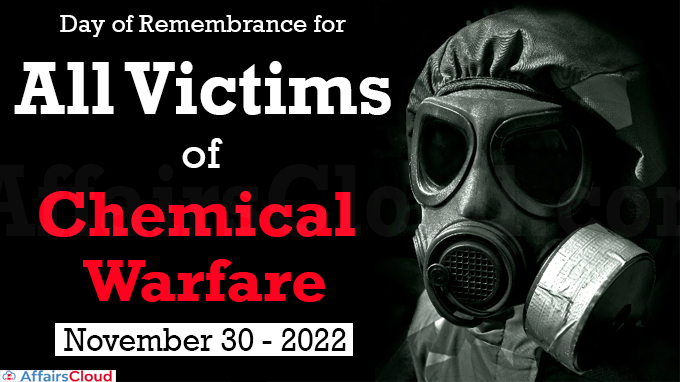
The day also reaffirms Organization for the Prohibition of Chemical Weapons (OPCW)’s dedication to the cause and aims to achieve the goals of peace, security, and multilateralism.
- The day aims to encourage efforts for eliminating the use of chemical weapons.
Background:
i. The 10th session of the Conference of the States Parties to the Chemical Weapons Convention held in 2005 endrosed the proposal to declared April 29 of every year as the Day of Remembrance for All Victims of Chemical Warfare.
- 29th April marks the date in 1997 on which the Chemical Weapons Convention came into force.
ii. Since 2005, the UN has officially recognised and observed the Day of Remembrance for all victims of chemical warfare, following the suggestion by Rogelio Pfirter, Director-General of OPCW.
iii. The Conference of the States Parties to the Chemical Weapons Convention, at its 20th session (2015), proposed the establaihsment of OPCW day and decided that
- the 29th April of every year as the International Day for the Foundation of the Organisation for the Prohibition of Chemical Weapons (“OPCW Day”)
- The Day of Remembrance for all victims of chemical warfare will be held on 30th November each year or, when appropriate, on the first day of the regular session of the Conference.
- Note: These arrangement commenced with effect from 2016.
iv. The 1st Day of Remembrance for All Victims of Chemical Warfare was observed on 30th November 2016.
About Chemical Weapons Convention (CWC):
i. The Chemical Weapons Convention (CWC), is a multilateral treaty that bans chemical weapons and requires their destruction within a specified period of time.
- It is comprised of a Preamble, 24 Articles, and 3 Annexes: the Annex on Chemicals, the Verification Annex, and the Confidentiality Annex.
ii. It aims to eliminate an entire category of weapons of mass destruction by prohibiting the development, production, acquisition, stockpiling, retention, transfer or use of chemical weapons by States Parties.
Elimination of Chemical Weapons:
To carry out the goals and objectives of the Chemical Weapons Convention, the States Parties to the Chemical Weapons Convention formed the Organization for the Prohibition of Chemical Weapons (OPCW).
Agenda for Disarmament and Chemical Weapons:
In 2018, UN Secretary-General António Guterres launched Securing our Common Future: An Agenda for Disarmament.
- It outlines a vision of disarmament initiatives that help put the world on a path toward sustainable peace and security for all.
About the Organisation for the Prohibition of Chemical Weapons (OPCW):
i. Currently, the OPCW Member States account for over 98% of the world’s population, landmass, and chemical industry.
ii. In 2013, the Nobel Peace Prize was awarded to the OPCW “for its extensive efforts to eliminate chemical weapons”.
Director-General- Fernando Arias
Members of Executive Council- 41 Member States
Headquarters- The Hague, Netherlands